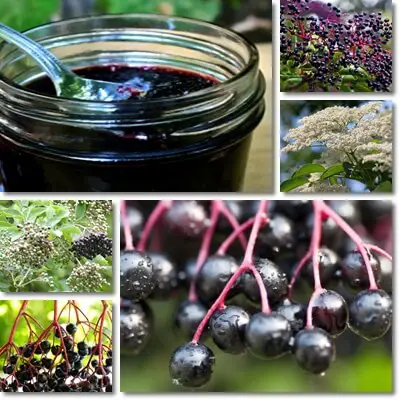Elderberry syrup is a long-standing natural remedy for the common cold, flu and sinusitis symptoms. Studies show elderberry preparations hold important antiviral properties and boost and activate the immune system for a stronger inflammatory response which not only helps improve symptoms such as nasal congestion and supports recovery, but also shortens the length of respiratory infections by 2 to 4 days. Syrups containing standardized elderberry extracts as well as home made products have exhibited impressive benefits in providing relief for cold and flu symptoms.
What is elderberry syrup made of? Elderberry syrup can be a standardized product made from elderberry juice extract and enhanced with various vitamins and minerals, such as Sambucol. There are also efficient home-made elderberry syrups which hold similar curative properties and antiviral action. A home-made elderberry syrup is essentially a liquid preparation obtained from boiling ripe elderberries, either fresh or dried with water. Raw honey is added to the cooled syrup to sweeten it and provide further relief. Other ingredients such as cinnamon, ginger, cloves or lemon juice are optional, but may be added for better flavor and additional benefits.

What are the benefits of elderberry syrup? Elderberry syrup can be used to reduce both the frequency and the length of existing respiratory infections. It is efficient against viral infections such as the common cold or influenza A and B, as well as against sinusitis, contributing to improved symptoms and faster recovery time. The syrup can also exert a strengthening action on the immune system with regular use, but treatment should not exceed a maximum of 12 weeks. Ideally, ask your doctor’s advice on the recommended dose and duration of treatment with elderberry syrup. Depending on the concentration of the product used, severity of the infection and general state of health of the person taking the remedy, the syrup may provide varying degrees of relief. Here are the top 4 benefits of elderberry syrup:
1) Immune-boosting properties
Influenza, or the flu, and the common cold are two of the two most common and contagious respiratory infections, the flu also having the highest potential for complications. There is no definitive cure for the flu or the common cold and only our own immune systems can handle the viruses behind the infections and eliminate them from the body. What elderberry syrup does is help boost the immune system, stimulating a certain type of white blood cells to produce inflammatory cytokines. In this case, inflammation is good because it is a sign of increased immune system activity and contributes to a stronger immune system response to the infection. The benefits are shorter duration of respiratory infections and milder symptoms, provided the syrup is taken at the beginning of the symptoms.
2) Antiviral activity
A study on 60 adult patients sick with the flu showed that taking 15 ml of elderberry syrup 4 times a day for 5 consecutive days reported an average reduction in the duration of the respiratory infection by 4 days (Randomized study of the efficacy and safety of oral elderberry extract in the treatment of influenza A and B virus infections). The elderberry syrup helped improve symptoms and contributed to a significantly reduced use of medication for symptoms management. The product is efficient against both type A and type B influenza. The antiviral action of the syrup is presumed to be a result of the high content of anthocyanin antioxidants in the fruit, also responsible for the purple-black color. Other polyphenolic antioxidants in the berries further contribute to these effects.

3) Antibacterial action
Studies show elderberries also exhibit antibacterial activity, which would explain the benefits of taking elderberry syrup, tea, tincture or other preparations for sinus infections of bacterial nature and bronchitis (Inhibitory activity of a standardized elderberry liquid extract against clinically-relevant human respiratory bacterial pathogens and influenza A and B viruses. BMC Complement. Altern. Med. 2011).
4) Elderberry syrup for flu, common cold and sinusitis
Relief can be attained by using elderberry syrup both during a respiratory infection and as a strengthening agent during flu or cold season. Symptoms of viral infections such as influenza, the common cold and sinus infections can be improved by use of elderberry syrup and the overall duration of the respiratory infection shortened by 2 to 4 days.
5) Elderberry syrup for cough and nasal congestion
The cold and flu symptoms that are reportedly most responsive to the use of elderberry syrup were cough and nasal congestion. It is presumed this is directly caused by the immune-boosting action of the berries which enhances the immune system response, allowing it to deal with the viruses better. Also, the elderberry syrups containing honey also helped improve sore throat.
Elderberry syrup side effects and interactions
1) Toxicity risks. Most elements of the elderberry plant, including the roots, twigs, leaves, flowers, raw, unripe and ripe berries and their seeds contain toxic elements. Only cooking and other forms of processing can render the berries and flowers safe for consumption and all elderberry preparations made at home should ensure proper processing to make the resulting preparations safe for consumption. If you experience diarrhea, nausea, vomiting and feel sick after taking elderberry syrup or other preparations, seek medical help immediately.
2) Potential for allergic reactions. Elderberries are not known as highly allergenic plants. However, anyone with existing allergies, especially multiple pollen allergies or allergies to related plants should proceed with caution when considering elderberry syrup and other preparations for use. It’s important to read the label carefully. Plenty of elderberry syrups and other preparations may contain other immune-boosting plants such as the highly allergenic Echinacea. Honey is another top food allergen commonly used to sweeten elderberry syrups made at home and should be avoided if you are allergic to bees, pollen or bee products. Read more about your favorite honey varieties.
3) Side effects for autoimmune conditions. Elderberry syrup has significant immune-boosting properties and can exacerbate autoimmune conditions such as rheumatoid arthritis, autoimmune thyroiditis and others. It is not recommended for use in such cases or if you are taking medication that suppresses the immune system.
Elderberry syrup for kids. Children are generally more sensitive to everything and different medications or natural preparations may have unexpected effects on them. The same is true for elderberry syrup and other preparations which should not be given to children of any age without consulting a doctor first. The most dangerous side effect is allergic reaction with anaphylaxis.
Elderberry syrup recipe
You can make your own elderberry syrup at home. For the simple recipe, you need the following ingredients:
– 4 cups of water
– 1 cup of dried black elderberries
– raw, unprocessed honey of your choice
How to make elderberry syrup at home:
1) Mix 4 cups of water with 1 cup of dried, black elderberries in a medium-sized pot.
2) Bring to boil, then leave to boil on medium to low heat until the liquid is reduced to less than half of its original amount.
3) Mash the elderberries in the pot, than strain them. Keep the liquid and discard the berry pulp, skin and seeds.
4) Let the elderberry liquid cool down, then sweeten with raw honey according to taste.
5) Keep in a glass recipient (jar or bottle) in the refrigerator and take according to need or doctor’s recommendations.
To make elderberry syrup healthier and more effective:
1) Make sure you use ripe, dark purple elderberries which are riches in anthocyanins.
2) Also, only add the honey after the syrup has cooled down; this way, the heat won’t affect the medicinal properties of the honey. Avoid adding honey or sugar while the syrup is boiling because sugars react with heat to form harmful compounds.
3) Only use raw, unprocessed, certified honey which maintains all of its beneficial properties. Local honey is also preferable.
4) You can add lemon juice containing vitamin C to the elderberry syrup you take every day to also get some immune-boosting vitamin C to fight off infections. The vitamin C found naturally in the berries is destroyed by the cooking process. Other optional ingredients include: ginger powder, cloves, cinnamon or other plant extracts of your choice and are best cooked together with the berries.
5) You can take your daily dose of 1 tablespoon of elderberry syrup with 1,000 mg (1 g) of vitamin C and 10 mg of zinc for an incredible boost in immune system function.
Conclusion
The benefits of elderberry syrup are not miraculous and will not cure the flu or the common cold all of a sudden or prevent them altogether. Still, the syrup constitutes an effective remedy for reducing symptoms severity and is especially helpful in improving cough, sore throat and nasal congestion. Its antiviral, antibacterial and immune boosting action is consistent with study findings which show it has the potential to reduce respiratory infections frequency and severity. The recommended intake for home-made elderberry syrup is one tablespoon a day for adults. For other preparations, read the label. For children, consult with your doctor first. If you have chronic conditions, talk to your doctor first about the benefits and side effects of taking elderberry syrup for your conditions.
